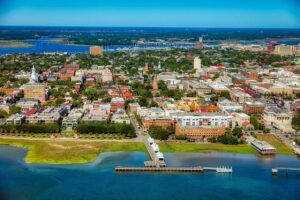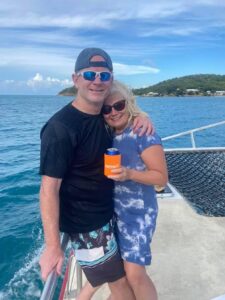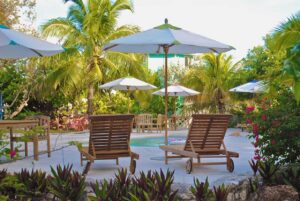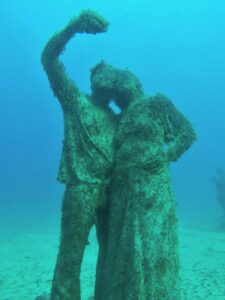Three miles north of the Verrazano Narrows Bridge, my wife Tammy and I didn’t expect the lump in our throats as the Manhattan skyline lay before us. One World Trade Center was standing at 1776 feet tall – the same year the Declaration of Independence was signed. Approaching New York from the water is impressive in itself, but this particular Sunday in June was beautifully clear with a deep blue sky and we couldn’t help but think of that horrific day on September 11th.
Sunday afternoon in New York Harbor is not for the inattentive boat operator, so my focus was quickly diverted to tug and barge traffic, ferries, every conceivable recreational craft along with a swimming competition too! It was good practice to have 2 VHF radios available on our Monk 36 trawler, Brighter Days. One tuned into Channel 16 (hailing and distress) and the other Channel 13 (ship to ship). Additionally, New York Harbor has a Vessel Traffic Service (VTS) operated by the USCG and, if your vessel is 65 feet or more in length, you should familiarize yourself with its procedures.
Leaving the East River with Governor’s Island on our starboard hand and the beautiful Statue of Liberty and Ellis Island to port, we made our way to the mouth of the Hudson River at the Battery. The river was named for Englishman Henry Hudson who, while working for the Dutch East India Company, explored the river up to what is now Albany, New York aboard the carrack, Halve Maen, pronounced “Half Moon.”
Our immediate destination was Liberty Landing Marina in Jersey City, New Jersey. It is ideally situated across the river from Manhattan and gives a 15% off transient dockage discount to Marinalife members. The Liberty Landing Ferry is adjacent to the marina, making a sojourn into Manhattan comfortable and convenient. We took advantage of this and visited the National September 11 Memorial & Museum, which was an easy walk from the ferry landing in Manhattan.
One could spend days, if not weeks in this location but our plan was to move north on this historic river. After two days we departed on a fair tide bound for Haverstraw Bay, 32 nautical miles away. The Hudson River is tidal all the way to Troy (134 nautical miles from the Battery) where the range of tide is 4.7 feet at its greatest. South of the George Washington Bridge, maximum flood current averages 1.6 knots and ebb slightly more at 2.2 knots. If possible, it’s a good idea to time your movement with the current.
Although industrial, this lower part of the Hudson was fascinating to see. Large buildings, car traffic on the adjacent roadways, trains, old piers and more ferries made us appreciate our unhurried pace amidst the hustle and bustle. Leaving the George Washington Bridge astern, the shoreline began to take on a more rural appearance, at least when compared to the big city behind us. On the western shore the Palisades stood grey and silent. These escarpments rise nearly 500 feet in places along the river’s banks. Further still, we passed under the Tappan Zee Bridge, the longest bridge in the State of New York at 4.881 miles.
After rounding Croton Point, we docked at Half Moon Bay Marina in Croton-on-Hudson. Steve, the dockmaster, kindly gave us a lift to a car rental agency where we procured a vehicle for three days. This enabled us to visit the Vanderbilt and Roosevelt estates, United States Military Academy at West Point and The Culinary Institute of America, where my wife treated me to a delicious birthday lunch.
Haverstraw Bay afforded us spectacular sunsets. Indeed, the bay offers a great anchorage for those wishing to do so, but it is exposed to wind from the west and northwest. Exercise caution if wind is forecasted from that direction. During summer months, that particular wind is often generated by thunderstorms.
Also, in mid-June, Clearwater’s Great Hudson River Revival was held at Croton Point Park. This annual two- day event features many well-known performers including David Crosby, Citizen Cope, Guster and Ani DiFranco. Proceeds are used to further environmental causes on the river, which has undergone a major clean up in the past decade.
Leaving Haverstraw Bay, we were excited about cruising through World’s End, the 13 mile bend between West Point and Constitution Island. We caught a glimpse of this extraordinary section of the river when we visited the military academy and couldn’t wait to see it from the water. We weren’t disappointed. As the river narrows the current increases as does the depth, which approached 200 feet in places. Majestically, the land rises high above the river. A modern merchant ship would be dwarfed transiting this area. Looking to our port side, Storm King Mountain, stands at 1340 feet along the river. In 1778, American soldiers assembled a chain across the river leading from West Point to Constitution Island to impede British shipping on this strategic waterway.
We continued north past Newburgh to Shadows Marina in Poughkeepsie, halfway to Troy, our intended turnaround point. Poughkeepsie’s close proximity to Hyde Park makes it an ideal stopover for land excursions. The current ran swiftly through the marina docks requiring heightened attentiveness when at maximum current.
The following day our move south was foiled by the remnants of Tropical Storm Bill, which was headed into the Hudson River Valley. Seeking better shelter, we cruised another 12 miles north to Rondout Creek and found a secure berth at Rondout Yacht Basin just south of Kingston. Heavy rain and our need to return to Baltimore prevented us from exploring the town of Kingston, which was disappointing.
Despite frequent marginal weather, unusual for June, we had a wonderful time cruising the Hudson. There is much to see and do. For American history buffs, it is a worthy destination. For those who have the time, there are many places to explore on the Upper Hudson, Erie Canal, Lake Champlain and beyond. The siren call of those undoubtedly beautiful upper reaches eluded us this time. However, in the words of a well-known cyborg, “We’ll be back.”





